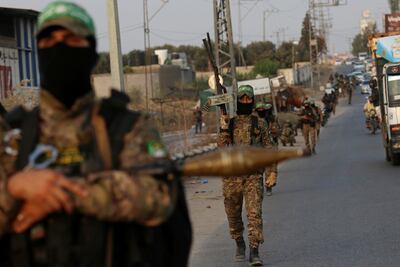The Islamic Revolutionary Guard Corps is “Iran’s premier agent for terrorism” and should be designated as a terrorist organisation, a British Conservative MP and former minister has said.
As talks on resuscitating the Iran nuclear deal broke up in Doha this week, the UK parliament held a debate on the country's role in the agreement.
MPs tore apart the 2015 accord during a session described as the “last opportunity” for them to discuss the matter before its potential return.
Speaking in the House of Commons, Robert Jenrick, a former minister, called on the government to add the IRGC to its list of designated terrorist groups alongside Hamas and Hezbollah.
He claimed reports the US was considering delisting the group from its list of foreign terrorist organisations as a concession to push the deal through would “make a mockery of the efforts that we have made in recent years to proscribe Hamas and Hezbollah if we would be signing up to a deal that legitimises the very organisation that funds Hamas and Hezbollah”.

The Joint Comprehensive Plan of Action (JCPOA) was signed in 2015 by Iran, the EU, the five permanent members of the UN Security Council — China, the US, the UK, France and Russia — and Germany.
In exchange for the rolling back of western sanctions, Tehran agreed to give international inspectors access to key nuclear sites and to put curbs on its programme. Iran insists it is pursuing nuclear development for peaceful purposes.
Opening Thursday’s debate in the House of Commons, Mr Jenrick declared: “Iran stands on the verge of possessing a nuclear bomb. In fact, intelligence suggests that they have sufficient enriched uranium today for at least two nuclear weapons.
“They have progressed far beyond the parameters of the JCPOA, so restoring Iran to the old deal simply doesn’t have any of the benefits we once thought it would.
“The JCPOA’s time has been and gone; the Rubicon has been crossed.”
Mr Jenrick added that “today’s debate could perhaps be the last opportunity to evaluate the merits or otherwise of a return” to the pact, which was hailed as a major accomplishment by negotiators when it was first signed.
However, Foreign Office minister Vicky Ford advised Tehran to “urgently” accept the offer on the table, adding: “There will not be a better one.”
The UK and its allies will “carefully consider all options” if no deal is struck soon and the JCPOA collapses, Ms Ford added.
Former US president Donald Trump campaigned on a pledge to pull the country out of the accord. True to his promise, he scrapped Washington’s membership in the agreement in May 2018 and reimposed sanctions on Iran.
Talks in Vienna sought to get the US to return and have Iran restore limits on its rapidly advancing nuclear programme, but they have been on pause since March.
It was also confirmed on Thursday that two days of indirect negotiations between the US and Iran in Doha broke up without any sign of a breakthrough.
Ms Ford, concluding the debate on Iran’s nuclear programme, told the House of Commons: “In March 2022, we left Vienna after reaching the end of talks — at that point there was a viable deal on the table, which would return Iran to compliance with its commitments and would return the US to the deal, reversing Iran’s nuclear escalation and lifting US sanctions related to the JCPOA.
“Iran has not accepted that deal and time is running out. Iran should urgently take the offer on the table. There will not be a better one.”
Ms Ford agreed the JCPOA was “not perfect” but said it represented a route for constraining Iran’s nuclear programme.
Tory MP Andrew Murrison, a former Foreign Office minister, said attempts to revive the deal have failed “and now it is comatose”.
“I suppose we shouldn’t turn off the life support entirely, but we have got no need to bust a gut, in my view, trying to revive it,” he told the Commons.
“What we need is a stronger, longer deal. Indeed, with every day that passes, JCPOA becomes less attractive. As Iran’s technical capabilities advance, the original terms become redundant and sunset clauses loom large.”


